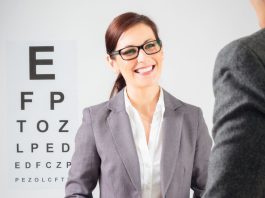Eyeglasses have long been associated with vision correction, but their influence extends far beyond improving sight. They can significantly impact how individuals perceive themselves and how they are perceived by others. This article delves into the psychological and social dimensions of wearing glasses, exploring how they can enhance self-confidence and alter self-image.
The Psychology Behind Eyewear
Wearing glasses can influence an individual’s psychological state. The concept of enclothed cognition suggests that clothing and accessories can affect a person’s mental processes and self-perception. Glasses, as a prominent facial accessory, can thus play a role in shaping one’s confidence and behavior.
Historical Perceptions of Glasses
Historically, glasses were often associated with intelligence and studiousness. However, they also carried negative connotations, such as being labeled as “nerdy” or “unattractive.” Over time, these perceptions have evolved, with glasses becoming a fashion statement and a symbol of sophistication.
Glasses and Self-Image
An individual’s self-image can be significantly influenced by wearing glasses. For some, glasses enhance their appearance and boost self-esteem. For others, especially those new to wearing them, glasses may initially cause self-consciousness. Over time, many come to see glasses as an integral part of their identity.
Social Perceptions of Eyeglass Wearers
Society often perceives individuals wearing glasses as more intelligent, reliable, and professional. These perceptions can positively impact social interactions and opportunities. However, some studies suggest that glasses can also lead to stereotypes, affecting how wearers are treated in various contexts.
Enclothed Cognition: Dressing the Part
The theory of enclothed cognition posits that the clothes and accessories we wear can influence our psychological processes. Wearing glasses can make individuals feel more competent and focused, thereby enhancing their performance in tasks requiring attention and precision.
The Looking-Glass Self: Reflecting Others’ Views
The concept of the looking-glass self suggests that individuals develop their self-concept based on how they believe others perceive them. Wearing glasses can thus influence self-perception, as individuals internalize the reactions and judgments of those around them.
Glasses as a Fashion Statement
In recent years, glasses have transcended their functional role, becoming a key fashion accessory. Designers and celebrities have embraced eyewear, showcasing a variety of styles that allow individuals to express their personality and taste.
Impact on Professional Life
In professional settings, glasses can convey a sense of intelligence and diligence. They can enhance an individual’s credibility and influence how colleagues and clients perceive them. However, it’s essential to choose frames that align with one’s professional image and personal style.
Choosing the Right Frames
Selecting the appropriate frames is crucial for comfort and confidence. Factors to consider include face shape, skin tone, and personal style. The right pair of glasses can accentuate features and complement one’s overall appearance, boosting self-assurance.
Age and the Glasses Experience
Children and Glasses: Building Confidence Early
Introducing glasses to children can be challenging, as they may feel different from their peers. However, with supportive environments and stylish frame options, children can embrace glasses as a positive aspect of their identity.
Teenagers and the Quest for Identity
For teenagers, glasses can either be a source of insecurity or a means of self-expression. Peer perceptions play a significant role, and fashionable eyewear options can help teens feel confident and unique.
Adults Embracing Eyewear
Adults often view glasses as a practical necessity, but they can also be a fashion statement. Embracing eyewear can lead to increased self-confidence and a renewed sense of style.
Seniors and the Acceptance of Glasses
For seniors, glasses are commonly associated with aging. However, modern frame designs offer stylish options that can help seniors feel youthful and confident.
Gender Perspectives on Eyewear
Gender can influence how individuals perceive and choose eyewear. While societal norms have traditionally dictated specific styles for men and women, contemporary fashion encourages breaking these boundaries, allowing for more personalized choices that reflect individual identities.
Cultural Variations in Eyewear Perception
Cultural backgrounds significantly impact perceptions of glasses. In some cultures, glasses are seen as a sign of wisdom and respect, while in others, they may carry different connotations. Understanding these cultural nuances is essential for global interactions and personal confidence.
Overcoming Negative Stereotypes
Despite the positive associations, some negative stereotypes about glasses persist. Challenging these stereotypes involves promoting diverse representations of glasses in media and encouraging individuals to embrace eyewear as a form of self-expression.
Media Influence on Eyewear Trends
Media plays a pivotal role in shaping public perceptions of glasses. Celebrities and influencers sporting stylish frames have contributed to the normalization and popularity of eyewear, influencing fashion trends and societal attitudes.
Eyewear in Pop Culture
From iconic characters in films to real-life personalities, glasses have been a defining accessory in pop culture. These representations have the power to influence public perceptions and inspire individuals to view glasses as a positive and stylish choice.
Psychological Studies on Eyewear and Confidence
Research indicates that wearing glasses can affect self-esteem and how individuals are perceived by others. Studies have shown that glasses can enhance perceptions of intelligence and competence, which in turn can boost the wearer’s confidence.
Personal Stories: Transformations Through Glasses
Many individuals report significant boosts in confidence after finding the right pair of glasses. These personal narratives highlight the transformative power of eyewear in shaping self-image and enhancing social interactions.
Tips for Boosting Confidence with Glasses
- Choose Frames That Reflect Your Personality: Select styles that align with your personal taste and make you feel comfortable.
- Ensure Proper Fit: Ill-fitting glasses can cause discomfort and self-consciousness.
- Embrace Your Look: Confidence comes from within; wear your glasses with pride.
- Experiment with Styles: Don’t be afraid to try different frames to find what suits you best.
Alternatives: Contacts and LASIK
For individuals who may not feel confident in glasses, there are alternative vision correction options like contact lenses and LASIK surgery. While contacts offer a glasses-free appearance, LASIK provides a more permanent solution. However, each option comes with its own set of pros and cons, and the choice should be based on lifestyle, comfort, and medical advice.
Future of Eyewear: Smart Glasses and Beyond
As technology advances, eyewear is evolving beyond vision correction. Smart glasses, featuring augmented reality and integrated digital functions, are reshaping how we interact with the world. This next generation of eyewear may further influence confidence and identity as people adapt to new forms of self-expression and utility.
Conclusion
So, can glasses change how you see yourself? Absolutely. Eyewear affects much more than just your vision—it can shape your identity, boost your confidence, and influence how others perceive you. From childhood to adulthood, across cultures and genders, the act of wearing glasses intertwines with psychology, fashion, and personal development.
Whether you choose glasses for necessity or style, they hold the power to enhance self-perception and foster a stronger, more confident version of yourself. Embrace the frames that reflect your personality and walk taller, knowing you look and feel your best.
Frequently Asked Questions (FAQs)
Q1: Can glasses improve self-confidence?
Yes, many people report feeling more confident when they find glasses that suit their face and style. The psychological effect of wearing glasses—feeling more competent or professional—can contribute significantly to boosted self-esteem.
Q2: Why do some people feel self-conscious wearing glasses?
This can be due to societal stereotypes or personal insecurities. However, modern eyewear offers a wide range of stylish options that allow individuals to find frames that enhance their appearance and express their identity.
Q3: Are glasses still considered “nerdy”?
That stereotype has largely faded. Glasses are now seen as fashionable and are often worn as a style accessory, even by those who don’t need vision correction.
Q4: How can I choose glasses that make me feel confident?
Look for frames that match your face shape, skin tone, and personal style. Trying on different pairs and getting feedback can also help you find the right match.
Q5: Can wearing glasses affect how others perceive me professionally?
Yes, studies suggest that people wearing glasses are often seen as more intelligent, capable, and trustworthy. This perception can positively impact professional interactions and opportunities.





